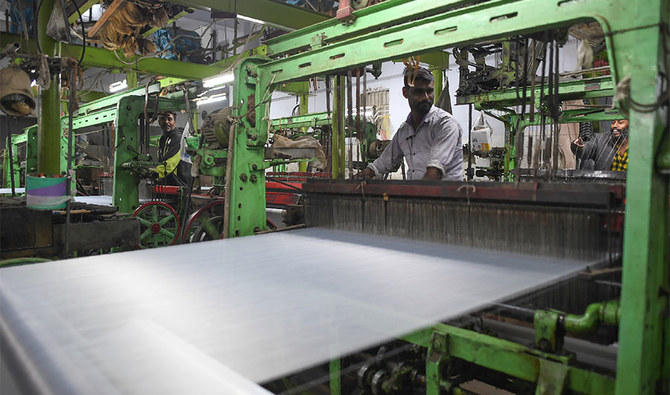KARACHI: Last week, Taiwanese textile manufacturers expressed interest in business opportunities in Pakistan, viewing the country as a potential springboard to export textiles to Europe and other destinations owing to the South Asian country’s cheaper labor and Generalized Scheme of Preference (GSP) plus status, Taiwanese and Pakistani textile manufacturers say.
“Pakistan has assured us to make the visa process easier, we would visit Pakistan and do a survey of existing investment opportunities in the textile sector,” Justin Huang, President of Taiwan Textile Federation, told Arab News on phone from Taipei on Thursday.
Taiwanese textile manufacturers say they are also counting on Pakistan’s GSP plus status for exports to Europe and Free Trade Agreement FTA with China.
“The major attraction is FTA between Pakistan and China. The other benefit is that the overseas investors enjoy 10-year tax holiday and access to EU markets through GSP plus status”, Huang said.
The European Union’s GSP allows for duty-free imports to come into the EU market from vulnerable developing countries. This helps these countries alleviate poverty and create jobs based on international values and principles, including labor and human rights.
“They [Taiwanese] are seriously thinking of relocating their textile industries or undertaking joint ventures with Pakistani counterparts as they are facing high labor costs. They say that the industries in Taiwan are not viable due to high labor costs but in Pakistan a cheap labor market exists that they intend to benefit from,” Ijaz Khokhar, chief coordinator for Pakistan Readymade Garments Manufacturers & Exporters Association (PRGMEA) and regional president of the International Apparel Federation (IAF), told Arab News.
Pakistan was granted GSP plus status back in 2014, which has enabled the country to export 55 percent more products to the EU market, according to Jean François Cautain, European Union Ambassador to Pakistan.
The GSP Plus status enables around 20 percent of Pakistani products to enter the EU market without any duties while on 70 percent, preferential rates apply. Other regional competitors the Philippines and Sri Lanka also enjoy GSP plus status.
Pakistani exporters who hosted Taiwanese counterparts held a B2B meeting to explore joint ventures or relocation of industries.
“I was the part of the first group who visited Pakistan and we found potential there once the visa process is made easier and opened we would visit again for investment purpose”, Justin Huang endorsed.
Pakistan’s textile players are also planning a trip to Taiwan, though no date has yet been finalized.
“Pakistani textile manufacturers have offered them [Taiwanese] to jointly work on raw materials for the production of finished goods in the country. They are interested in relocating industries to benefit from the GSP plus status and other facilities as well,” Khokhar said.
“Pakistani apparel makers use cotton or polyester material for their products and Taiwanese’ major strength is the functional textile. If we work with Pakistani apparel manufacturers that would be helpful to them to upgrade products for the international market in the backdrop of price competition with African suppliers or Bangladeshi suppliers”, Huang noted.
Another major attraction that Pakistan offers to foreign investors is the mega China Pakistan Economic Corridor (CPEC) project under which China is investing around $70 billion in the country on infrastructure, road networks and industrialization.
“We expect the Taiwanese industrialists will help us in the transfer of technology and provide training to our workforce,” Khokhar added.
Pakistani exporters say Taiwanese investors expect to benefit from both CPEC and the free trade agreement (FTA-II) with China that in return will help Pakistan in terms of training and investment.
















